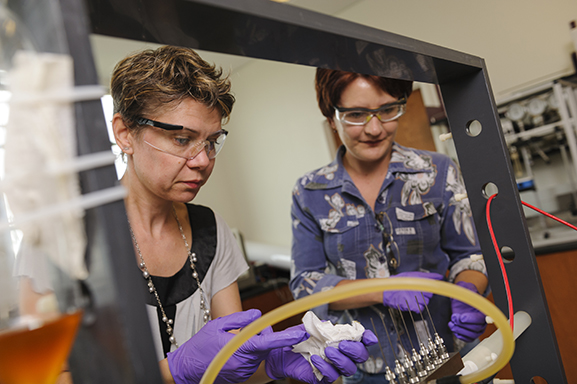
From the September 2014 edition of Desktop News | The U.S. Department of Energy has awarded a University of Alabama start-up company approximately $1.5 million to help extract uranium from the ocean using an innovative magnet – a compound found in shrimp.
Uranium, the fuel for nuclear power, naturally occurs in seawater and in the Earth’s crust. Scientists have sought for decades a more economical and efficient way to remove it from the ocean. Using chitin, a compound found in shrimp shells and other crustaceans and insects, the UA group is developing just such a method. Through the grant, they are working to develop an absorbent, biodegradable material made of chitin that will allow them to withdraw uranium from the ocean when the material is suspended beneath the ocean’s surface.
Dr. Gabriela Gurau, who received her doctorate in chemistry from the College of Arts and Sciences, leads the company, 525 Solutions, as its CEO. She is partnering with Dr. Robin Rogers, professor and holder of a Robert Ramsay Chair in the Department of Chemistry, and Dr. Julia Shamshina, a UA alumna who serves as the company’s chief technology officer, for the project.
“Every scientist in the world, except us, who is trying to do this is working with plastics,” Gurau said. “The oceans are estimated to contain more than a thousand times the amount of uranium found in total in any known land deposit. Fortunately, the concentration of uranium in the ocean is very, very low, but the volume of the oceans is, of course, very, very high. Assuming we could recover only half of this resource, this much uranium could support 6,500 years of nuclear capacity.”
Earlier work led by Rogers, who is also the director of UA’s Center for Green Manufacturing, initially proved the concept for extracting uranium using chitin. Rogers is an owner and founder of 525 Solutions and serves as a scientific adviser to the company’s representatives.
525 Solutions is one of more than a dozen startup companies calling The University of Alabama home. The company received early assistance and mentoring through the Office for Technology Transfer within UA’s Office of the Vice President for Research. Research by the company’s scientists has led to the awarding of multiple patents.
Rogers extolled the potential environmental benefits of the company’s approach and addressed cost factors.
“Mining uranium from land is a very dirty, energy intensive process, with a lot of hazardous waste produced,” Rogers said. “If we eliminate land mining by mining from the ocean, we not only clean up the ocean, but we eliminate all of the environmental problems with terrestrial mining.
“Research studies have shown that uranium can be extracted from the ocean, but the process remains prohibitively costly,” said Rogers, a two-time UA graduate. “The search for more effective adsorbents – which is what we’re doing – is under way and expected to solve this issue.”
The two-year grant was awarded by the U.S. Department of Energy’s Office of Science through its Small Business Innovation Research and Small Business Technology Transfer programs.
For more information about the project, visit http://ua.edu/news/2014/07/shrimp-30000-volts-help-ua-start-up-land-1-5-million-for-uranium-extraction.